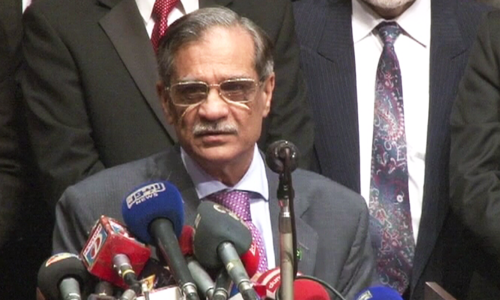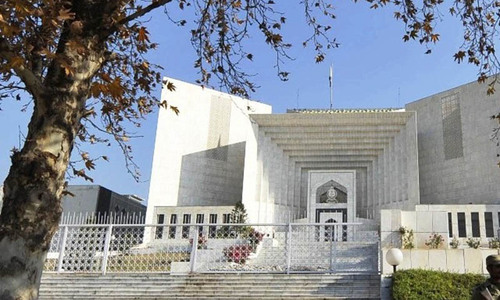ISLAMABAD: Chief Justice of Pakistan Asif Saeed Khosa on Wednesday warned of a national crisis in the days to come if the multitude of out-of-school children do not get education.
“The private school system only caters to a fraction while a huge number of children are not being taught and eventually may become a national security issue in future,” feared the chief justice while heading a three-judge bench seized with a set of cases relating to educational institutions and increase of fees by the private institutions.
A number of private schools have challenged before the Supreme Court the government’s decision of capping increase in the school fee at five per cent annually for three years.
Read: SC orders 20pc reduction in private school fees over Rs5,000
Regrets that talent is being wasted since government schools have vanished and some in villages are being used as animal barn
To defend the country by coping with such a security threat, the chief justice suggested the government should consider investing in or diverting a few billions more to the education sector to arrest the tide.
The observation came when Advocate Shahzad Ellahi — while representing the City School System — argued before the court that it was wrong to suggest that children studying in the private school system were being exploited. It was the children paying only Rs500 as fees in a public school who were being exploited since they could not even write their names after three years of education, he said. On the other hand, he added, the children getting education in private schools doing O levels and A levels were getting scholarships from foreign universities or other educational institutions.
“We never object to a lawyer getting Rs10 million for only three days of appearance in a court but oppose the demand of an educationist with years of experience and hundreds of school branches to his credit for a few million as a monthly salary,” the counsel regretted.
The state was not fulfilling its responsibility of providing quality education to the children and had instead passed the entire burden upon the shoulders of the private schools, advocate Ellahi contended.
The chief justice, however, regretted that talent was being wasted since the government schools which used to charge Rs150 as fees had fast vanished and some in villages were being used as barn to keep livestock. The opportunity of getting good education has closed for many bright and talented children, the chief justice said.
The counsel contended that there was nothing on record to show that the children or their parents were being exploited or they were unable to pay the fees.
“We also live in this society and know parents have to sacrifice a lot by sometimes doing multiple jobs only because they are worried about the future of their children,” the chief justice observed.
The counsel argued that through the regulatory framework the executive was causing private schools a slow death as these schools would eventually die because of the five per cent cap introduced by the government through the regulatory law.
At this Justice Ijazul Ahsan cited the balance sheet of the City School System and pointed out that the profits earned by the school in one year was Rs358 million with 36 per cent average returns on equity.
“This is some slow death!” quipped Justice Ahsan while regretting that it seemed the private schools were in a hurry to make every possible profit.
The chief justice highlighted that there were three parties to the present case, namely the legislators who have made the law of capping fee hike, private school imparting education and the third party being the children and the parents.
Therefore, someone had to take care of the interest of the third party in a way that the private schools might grow but in the process the children must not be hurt, he said.
If the state wanted to outsource its responsibility of providing education by involving the private sector, the chief justice explained, they could do it by dictating its own terms in the form of regulation.
The chief justice observed during the hearing that the court had been told many a time that due to recent devaluation, doing business like running a private school had been rendered non-feasible. In a democratic process, pressure could be mounted on the legislators to change the law, the chief justice suggested.
Published in Dawn, May 9th, 2019















































